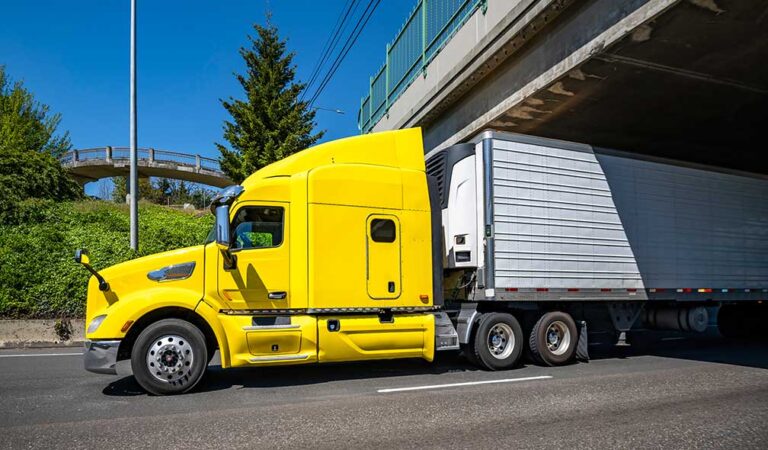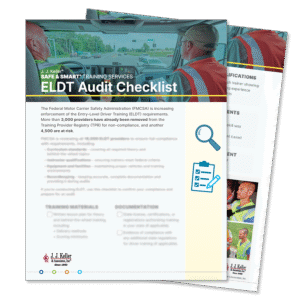Buying and operating their own truck is an option many commercial drivers take advantage of. Before taking the plunge and shelling out money on a tractor, however, there are several things to consider.
There are multiple ways to obtain a truck and there are several options for how you’ll run it once you own it.
One of the first choices you’ll need to make is whether your business will be completely on its own or you’ll enter an agreement as an independent contractor (IC). In a strange twist of words, you’ll be far more “independent” operating under your own authority than if you lease your truck as an IC.
However, if you’re buying your first truck, It might be best to start with the structure of a large carrier.
Carriers provide numerous services.
There’s a management hierarchy of course, starting with the CEO or president and working down to individual fleet managers or dispatchers. If you decide to operate completely independently, you’ll be responsible for fulfilling the roles of all of these positions … and that’s only the beginning.
A large carrier will have a sales department that keeps relationships going smoothly with existing customers while seeking out new ones. A customer service team works with customers to secure more loads and make sure everything is running smoothly.
There’s a billing or collections team that sends out bills and collects payments, including someone to contact customers that don’t pay on time. Aso, an accounts payable department keeps the bills paid.
A carrier’s safety department does a lot more than conduct meetings and discipline drivers who’ve made mistakes. They’ll make sure the carrier is in compliance with regulations and utilize technology and driver training to help keep accidents down and help the company secure the most favorable insurance rates.
The team that registers trucks and obtains needed permits is usually attached to the safety department, but not always. Compliance with drug and alcohol testing requirements usually falls under safety as well.
Don’t forget the maintenance division. They’ll work on trucks, deciding when to farm out work to vendors if projects are more than their technicians can handle. They’ll also keep a network of vendors for on-road repairs when necessary. Often, maintenance keeps track of fuel cards and develops a network of fueling locations.
There’s also a driver recruiting department. Of course, if you’re driving your own truck you won’t need a recruiting department — but recruiting isn’t all they do. This team is generally responsible for checking the background of new driver applicants, making sure the files are complete for each one. And don’t forget human resources and benefits teams that make sure benefits are administered properly. Human resources is often involved in selecting the insurers that provide health, dental, vision and other coverages for employees.
Once you purchase your own truck, you’ll be responsible for the tasks performed by all these departments.
It takes a lot of work — and more importantly, it takes knowledge and experience to become good at all of them. After all, if you’re busy chasing down payment for a reluctant customer, setting up an account with a new one and verifying that you’re in compliance with drug and alcohol regulations, it can be difficult to work time into your schedule to actually pick up and deliver freight.
That’s why some truck owners choose to enter into a lease agreement for their equipment. The lease agreement basically says that the carrier can use your truck to haul their freight, but you must provide a driver and take care of the costs of operating a trucking business, such as fuel and repairs. In return, the carrier supplies loads for which you are paid an agreed amount per mile or a percentage of load revenue. You’ll be gaining the benefit of the work of all those other departments — but keep in mind that the carrier shares the revenue earned with you.
Being an IC does have its downside.
One large drawback you’ll face as an IC is that you won’t be paid employee benefits like health insurance, retirement accounts and vacation or holiday pay. Since you’re working for your own company, you’ll be responsible for providing those benefits for yourself. Some ICs benefit from a spouse that earns those benefits at a job.
Another drawback is that you’ll need to pay self-employment tax. Company employees benefit because the employer pays half of their Social Security and Medicare taxes. As an IC, however, you’ll pay both the employee and employer shares of this tax.
Being an IC offers benefits, too.
As an IC, you should have freedoms that employee drivers don’t have. You can choose the hours you work, the routes you take, fueling locations and more. You can even choose which loads to take and which to refuse, or what areas of the continent in which you want to run.
A word of caution: Your relationship with the carrier is important. If you only take the best loads, or if you aren’t available when needed, your carrier may think you’re difficult to work with. When that happens, the loads you’re offered could change or be harder to come by at all.
Think about the kind of service you want from businesses you might deal with, such as a plumber or maintenance shop. If your plumber isn’t available when needed, or doesn’t perform the work on schedule or presents a bill much higher than the original estimate, you might be tempted to use a different one next time.
Think of the carrier to which you’re leased as your customer, and provide the level of service to them that you expect from others.
Are you ready to take on the responsibilities?
If you make the decision to obtain your own operating authority and manage your own business, you ARE a carrier.
Many carriers have logistics departments; these are actually freight brokerages, so you can still run the carrier’s freight without a lease agreement. You can select one trusted broker to deal with or deal with a different one every day if you like. Even better, you can develop your own relationships with shippers and avoid brokered freight altogether.
Running your own trucking company means different things to different owners.
The more independence you seek, however, the more responsibility you’ll take on. Some owners have a spouse that takes care of the administrative work while they focus on the driving, while some do it all themselves. It’s not unusual for an owner to start a lease to a carrier and then obtain authority as they learn more about their business, and themselves.
Cliff Abbott is an experienced commercial vehicle driver and owner-operator who still holds a CDL in his home state of Alabama. In nearly 40 years in trucking, he’s been an instructor and trainer and has managed safety and recruiting operations for several carriers. Having never lost his love of the road, Cliff has written a book and hundreds of songs and has been writing for The Trucker for more than a decade.














